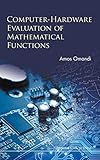Computer-hardware evaluation of mathematical functions Amos Omondi
Material type: TextPublication details: London : Imperial College Press, c2016.Description: xvii, 414 p. : ill. ; 24 cmISBN:
TextPublication details: London : Imperial College Press, c2016.Description: xvii, 414 p. : ill. ; 24 cmISBN: - 9781783268603
- 005.1
| Item type | Current library | Call number | Status | Date due | Barcode | |
|---|---|---|---|---|---|---|
| REGULAR | University of Wollongong in Dubai Main Collection | 005.1 OM CO (Browse shelf(Opens below)) | Available | T0055048 |
Includes bibliographical references (p. 397-410) and index.
Computer-Hardware Evaluation of Mathematical Functions provides a thorough up-to-date understanding of the methods used in computer hardware for the evaluation of mathematical functions: reciprocals, square-roots, exponentials, logarithms, trigonometric functions, hyperbolic functions, etc. It discusses how the methods are derived, how they work, and how well they work. The methods are divided into four core themes: CORDIC, normalization, table look-up, and polynomial approximations. In each case, the author carefully considers the mathematical derivation and basis of the relevant methods, how effective they are (including mathematical errors analysis), and how they can be implemented in hardware.This book is an excellent resource for any student or researcher seeking a comprehensive, yet easily understandable, explanation of how computer chips evaluate mathematical functions.
There are no comments on this title.
